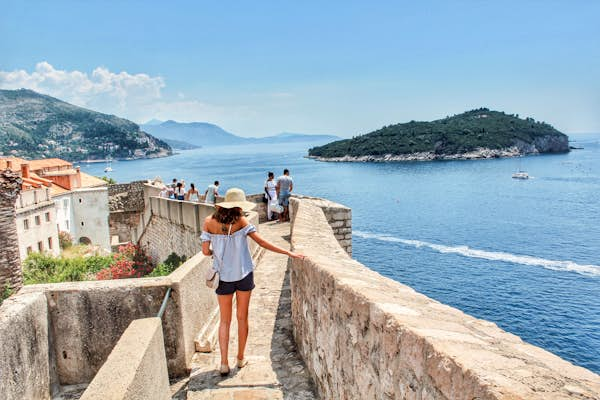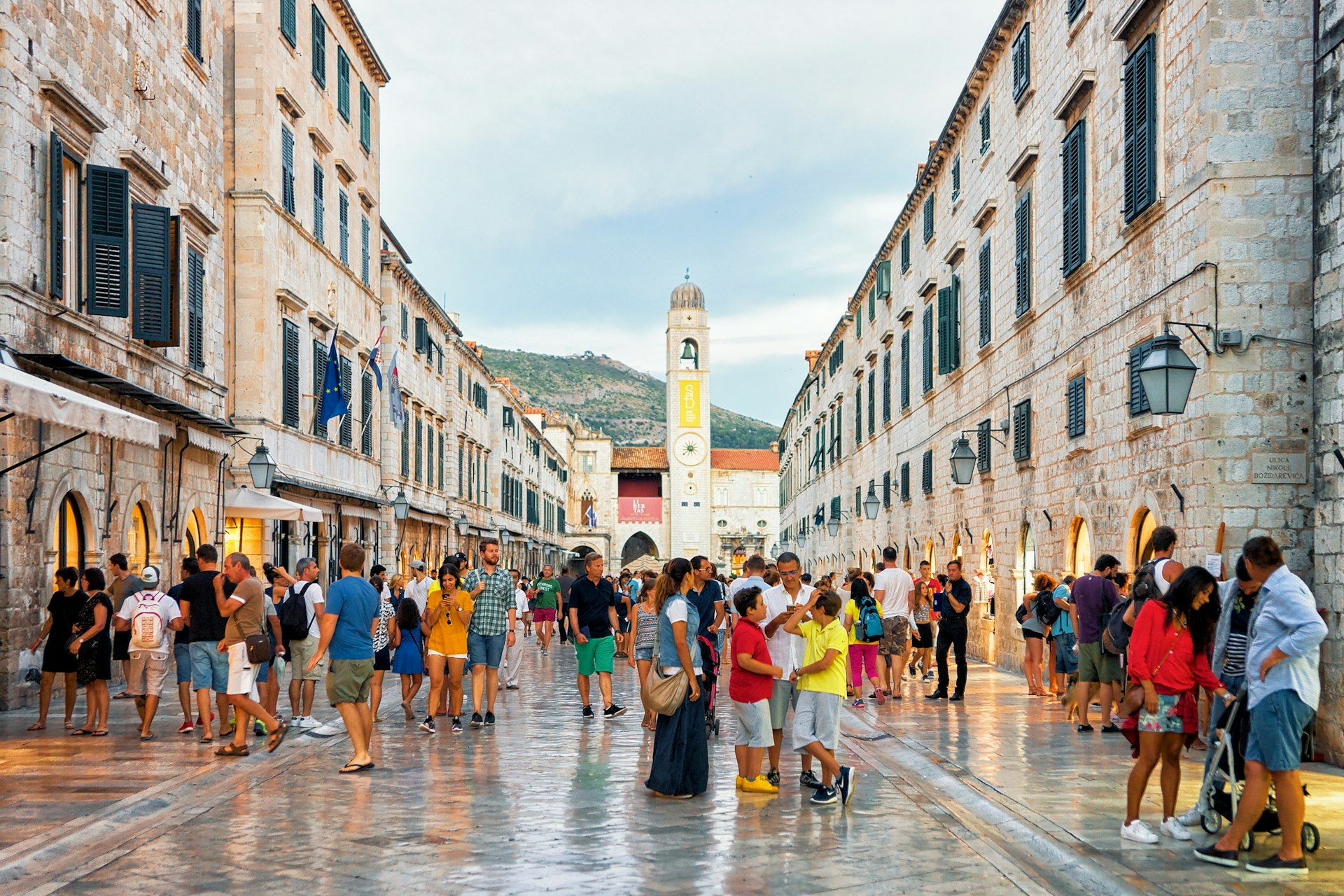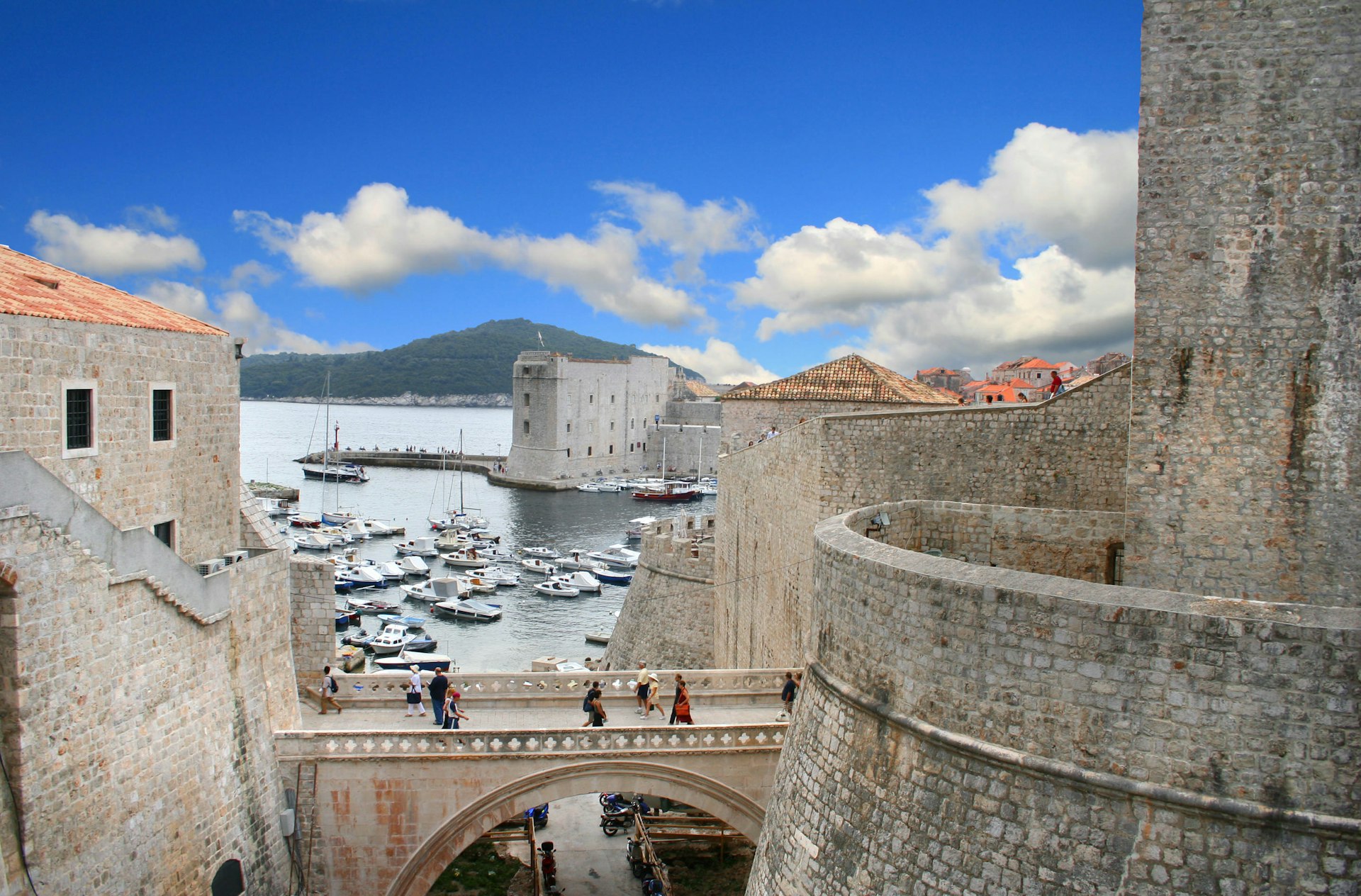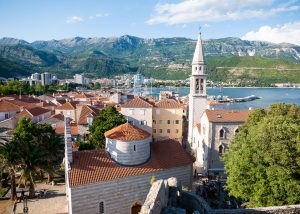
Tucked between looming Mt Srđ and the turquoise waters of the Adriatic Sea, the historic city of Dubrovnik scores highly for its stunning natural setting. Covering some 21.35 sq km (8.25 sq miles), this small city is easy to navigate – the 13th-century old town acts as its nucleus, but Dubrovnik stretches northwest along the coast to include the resorts of Lapad and Babin Kuk on the peninsula.
Naturally, visitors gravitate toward Dubrovnik’s star attraction, the historic old town – Stari Grad to locals – which is protected by massive fortified city walls. Most sights are concentrated within these walls, in a compact area of less than half a square mile, so the majority of visitors tackle Dubrovnik on foot.
To travel further afield, public transport is available to all corners of the city, including up to the main port of Gruž and across to popular Banje Beach to the east. And if you want to beat the crowds, boats offer a completely traffic-free travel option too. Here are the best ways to get around Dubrovnik.
Make the most out of every adventure with help from our weekly newsletter delivered to your inbox.
Explore Dubrovnik’s historic old town on foot
The best (and only) way to get around Dubrovnik’s compact old town is on your own two feet. Enclosed by its age-old walls, the old town is completely pedestrianized. The only motorized vehicles you may see here are early morning delivery vans servicing shops and restaurants on the Stradun, the main thoroughfare.
Strolling the Stradun and the grid of narrow lanes and alleys that extend from it is a delight. However, the old town can lose some of its sheen when it gets impossibly crowded in the peak summer season, especially when cruise ships are in port.
For a rewarding guided walking tour of Dubrovnik’s old town or tours themed around topics such as Game of Thrones or “Walls & Wars,” book a tour with Dubrovnik Walks.
Tips for avoiding the old town crowds in Dubrovnik: Check the Dubrovnik Port Authority website to see how many cruise ships are due to dock on any given day. If you can’t avoid the most congested days, plan to wander around the old town early in the morning to take everything in at a slower pace, noting the city’s fabulous architectural details. To get an idea of visitor numbers before you head out, take a peek at the live camera on the Stradun.
 Buses provide easy access to the beaches around Dubrovnik © Goran Jakus / Shutterstock
Buses provide easy access to the beaches around Dubrovnik © Goran Jakus / Shutterstock
Dubrovnik buses are cheap and efficient
Dubrovnik is not just about its old town. If you’re looking to take advantage of the city’s many parks and beaches, and explore sights beyond the center, public transport is a viable option. You can get around Dubrovnik easily on the excellent bus service operated by Libertas. Timetables are posted at most bus stops or can be consulted on the Libertas website.
Many visitors make use of the regular services linking Pile Gate on the western edge of the old town to Gruž, where the main port and bus station are located, as well as the beach resorts of Lapad and Babin Kuk. Most bus lines start running in the morning between 5:30am and 6am, continuing until around midnight. You’ll need to pay around 15 Croatian kunas (US$2.10) to the driver (they don’t have change), but you can save a few kunas by buying tickets in advance at city newsstands for 12 kunas (US$1.68).
If you plan to use the bus more than twice a day, it’s worth making the small investment for a 24-hour ticket (30 kunas/US$4.20). You can pick up single-journey tickets as well as 24-hour passes at the Libertas kiosk at Pile Gate.
Once onboard, validate your ticket by inserting it into the machine. Your ticket is then good to go for one hour, which should be more than enough time to reach your destination in this small city.
Tips for getting the bus in Dubrovnik: The Dubrovnik Card offers free or discounted access to tourist sights (including the city walls), and also free public transport. You get free bus rides for a fixed period, which varies depending on which card you buy. Wifi is free onboard Libertas buses – look for the “Libertas Mediaking” network and then follow the simple instructions to get connected.
Traveling to and from Dubrovnik airport by bus
Dubrovnik airport lies 22km (13.6 miles) southeast of Dubrovnik, near Čilipi. The drive to the center generally takes 30 minutes, but the trip can take longer during peak hours, especially in the summer. A private shuttle bus service operated by Platanus runs between the airport, Ploče Gate in the old town and the city bus station in Gruž; check the website for schedules and prices.
A cheaper but less convenient option is to take local transport to the town of Cavtat and then one of the regular bus services to Dubrovnik; the bus stop for Cavtat is located in front of the domestic arrivals terminal.
 The old town of Dubrovnik is pedestrianized and an atmospheric place to explore on foot © Roman Babakin / Shutterstock
The old town of Dubrovnik is pedestrianized and an atmospheric place to explore on foot © Roman Babakin / Shutterstock
You’ll need some patience to get around Dubrovnik by car
Be patient if you plan to get around Dubrovnik by rental car. The usual international hire companies have offices in town and at the airport, but traffic jams are common during the high season, and the city’s one-way traffic system is a big obstacle to smooth traffic flow. The areas around Pile Gate and Gruž in particular are often congested with long lines of vehicles and tourist buses.
Car parking in Dubrovnik
The covered parking lot at Ilijina Glavica is Dubrovnik’s biggest, with over 700 spaces, and it’s open 24 hours. From here, you can walk downhill through leafy Bogišićev Park to the old town in 10 to 15 minutes, but the climb back up can take a bit longer, depending on how much energy you have left after a day of sightseeing. Pay by the hour (45 kunas/US$6.30), or get a prepaid daily (520 kunas/US$72.80) or weekly ticket (2600 kunas/US$364).
If you’re traveling on a budget, consider parking at the lot located next to Gruž harbor and taking a public bus into town. Parking costs 20 kunas (US$2.80) per hour, or 200 kunas (US$28) for a daily ticket, and 1000 kunas (US$140) per week, saving you quite a few kunas for coffees on the Stradun.
Taxis and rideshares are easy to find in the city
Taxi ranks for licensed cabs can be found at the city’s Pile and Ploče Gates; check the large signs posted at each to see the official rates. Pull out your smartphone and compare these with the prices for rideshares via the Uber and Bolt apps. These tend to be more pocket-friendly.
 The harbor in Dubrovnik is dominated by the city’s towering medieval walls © Agata Dorobek / Shutterstock
The harbor in Dubrovnik is dominated by the city’s towering medieval walls © Agata Dorobek / Shutterstock
Bargain hard if you plan to explore Dubrovnik by boat
For a taste of how people got around in the time of the crusaders, consider exploring Dubrovnik by boat. Private taxi boats are a great way to avoid the inevitable traffic jams during high season, and you’ll feel like James Bond as you zip your way to the old town from the beach resort areas of Lapad or Babin Kuk. However, this convenience comes at a significant price. Private boat operators peddle their services from kiosks at the old town harbor and Gruž harbor, but you may have to bargain hard for a fair price.
Use ferries to reach nearby islands
A dedicated boat service runs every half hour to the forested island of Lokrum, with the fare included in the price of admission. Buy your ticket at the dedicated kiosk located on the pier in the harbor in Dubrovnik’s old town; for timetables, check the official Lokrum website.
Another popular service for visitors is the ferry to the nearby Elaphiti Islands (Lopud, Šipan and Koločep) departing from Gruž port. Head to the Jadrolinija office near the departure pier to purchase a ticket, or book online (schedules and ticket prices are on the website).
You can also get to the coastal city of Cavtat along the Adriatic coast. Adriana Cavtat offers regular boat transfers (as well as private cruises) during the tourist season.
 The cable car ride to the top of Mt Srđ offers dizzying views of the old town of Dubrovnik © Antonio Batinic / Shutterstock
The cable car ride to the top of Mt Srđ offers dizzying views of the old town of Dubrovnik © Antonio Batinic / Shutterstock
Take the cable car up to Mount Srđ
Dubrovnik’s iconic cable car dates back to 1969, and when it opened, it had the proud status of being the first cable car in the Adriatic. The original cableway was destroyed in 1991 during the war of independence, but its replacement once again links the old town with 2552 feet 778m (2552ft) Mt Srđ, whisking travelers to the top in under four minutes.
This is a favorite spot to take in the sweeping views of the old town and the sparkling waters of the Adriatic and its surrounding islands. The cable car runs from April to October, and services are fully accessible thanks to elevators and ramps. Check the website for opening hours and prices.
Buck the trend and hire a bicycle or e-scooter
It’s rare to see cyclists or e-scooter riders navigating Dubrovnik’s hilly streets, and the city doesn’t have a bike-share or scooter-share system. However, both bikes and scooters are available for rent from private operators; look out for fliers advertising rentals at the Dubrovnik Tourist Board office next to Pile Gate.
Accessible travel in Dubrovnik
Narrow city sidewalks and the old town’s side streets of uneven stones and steep stairways can be a real challenge for travelers with mobility issues. Unfortunately, the city walls can only be reached via a steep set of stairs. Newer hotels have been designed with accessibility in mind, but many older properties do not have elevators; check with your hotel in advance.
The city’s public bus system is accessible for wheelchair users and others with limited mobility, but not all buses feature ramps or a kneeling device. The Dubrovnik Cable Car can be accessed by everyone thanks to ramps and elevators. Wheelchairs and mobility scooters are available for rent across Croatia from MB Scooter Croatia. For more information, see Lonely Planet’s accessible travel resources.



